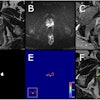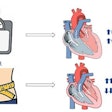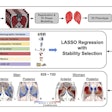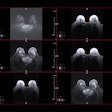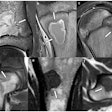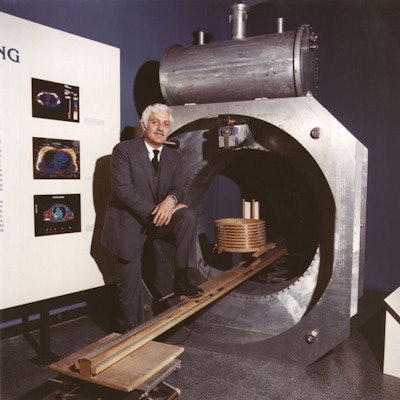
Dr. Raymond Damadian, considered by some people to be the "father of MRI," died on 3 August at the age of 86. Damadian was an important figure in the early development of the modality, and he generated controversy and debate right up to his death.
Damadian's work has left its mark on medical imaging since the late 1960s, said his son, Timothy Damadian, president and CEO of Fonar, the company that Raymond Damadian founded.
"Throughout all of the trials and tribulations he encountered while achieving this revolutionary medical breakthrough, Dr. Damadian never gave up on his dream," he noted in a press release issued on 5 August. "His persistence in the face of great adversity, especially among the scientific community, and his intense passion for trying to cure cancer led to the invention of a machine that has undoubtedly impacted and saved millions of lives."
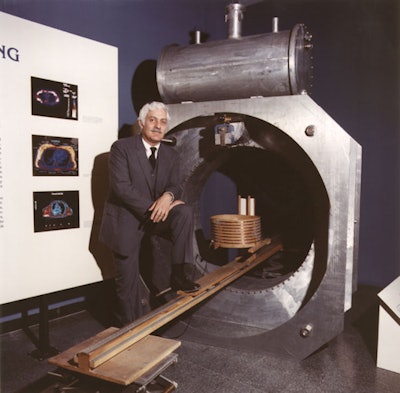 Dr. Raymond Vahan Damadian with the machine he named "Indomitable" at the Smithsonian Institution Exhibit in 1986. Image courtesy of Fonar.
Dr. Raymond Vahan Damadian with the machine he named "Indomitable" at the Smithsonian Institution Exhibit in 1986. Image courtesy of Fonar.Born in 1936 to Armenian-American parents, Damadian grew up in Forest Hills, New York. He was awarded a Ford Foundation scholarship to the University of Wisconsin and completed a degree in mathematics before earning his MD at Albert Einstein College of Medicine.
Upon graduating from medical school, Damadian joined the faculty at State University of New York (SUNY) Downstate in Brooklyn. During his tenure at SUNY, he encountered a tool used in chemistry called nuclear magnetic resonance (NMR) and began to explore how it might be used to image the body. He discovered that the relaxation times of NMR signals differed in normal and cancerous tissue.
Damadian published this finding in the journal Science in March 1971 and filed a patent for the research that same month. In July 1977, Damadian and colleagues produced the first human MRI scan from a machine they called "Indomitable," He started Fonar in 1978, and the company sold its first commercial scanner two years later.
President Ronald Reagan awarded Damadian the National Medal of Technology in 1988, and Damadian was inducted into the National Inventors Hall of Fame in 1989, joining other scientific pioneers such as Orville and Wilbur Wright, Henry Ford, Thomas Edison, and Alexander Graham Bell.
Nobel controversy
Damadian's role in the invention of MRI engendered intense debate. His supporters argued that he should receive a Nobel for his work on MRI, but he never did.
In a video interview conducted last month at ECR 2022, Prof. Hans Ringertz, who was head of the Nobel committee when Prof. Paul Lauterbur and Sir Peter Mansfield shared the Prize in Physiology or Medicine, reflected on the long-running controversy over the 2003 Nobel prize for MRI.
He insisted that the right call was made because the prize was given for the imaging aspects, and not for MR technology, the first scan of a human being, or anything else. "The controversy, even today, is based on the fact that they don't really understand that it was for the imaging," said Ringertz, who is professor emeritus at the Karolinska Institute in Stockholm, Sweden.
Other observers have suggested alternative reasons for the perceived slight of Damadian by the Nobel committee. Some attributed it to his belief in creation science, which finds scientific interpretations for the Bible and was described in detail in Smithsonian Magazine in 2003.
Nor did Damadian endear himself to the research community when he gave a blistering speech at a 2003 meeting of the International Society of Magnetic Resonance in Imaging (ISMRM), which some described as an attack on Lauterbur.
In subsequent years, Damadian kept a lower profile after this until 2021, when he delivered a lecture at the ISMRM meeting that further explicated how his religious faith had influenced his career.
Damadian is survived by his three children, nine grandchildren, and three great-grandchildren, and will be deeply missed, Timothy Damadian said.
"The world mourns the loss of the 'father of MRI,'" he said. "Dr. Damadian was a brilliant inventor, a compassionate physician, a devoted husband, a loving father, grandfather, and great-grandfather, and a trusted friend."



